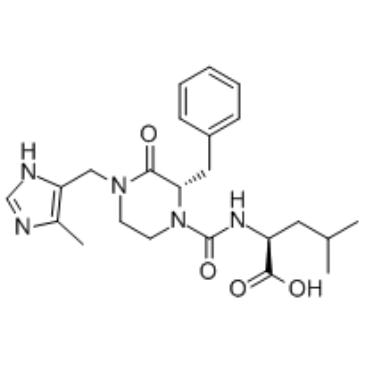| Description |
GGTI-2418 is a highly potent, competitive, and selective geranylgeranyltransferase I (GGTase I) inhibitor. GGTI-2418 inhibits GGTase I and FTase activities with IC50s of 9.5 nM and 53 μM, respectively. GGTI-2418 also increases p27(Kip1) and induces significant regression of breast tumors[1].
|
| Related Catalog |
|
| Target |
IC50: 9.5 nM (GGTase I), 53 μM (FTase)[1]
|
| In Vitro |
GGTI-2418 inhibits GGTase I and FTase activities with IC50s of 9.5±2.0 nM and 53±11 μM, respectively, a 5,600-fold selectivity toward inhibition of GGTase I versus FTase. GGTI-2418 demonstrates competitive inhibition of GGTase I against the H-Ras-CVLL protein with a Ki of 4.4±1.6 nM[1]. GGTi-2418 (10-15 μM; 16 hours) treatment delocalizes FBXL2 and stabilizes IP3R3[2]. Western Blot Analysis[2] Cell Line: HeLa cells Concentration: 10-15 μM Incubation Time: 16 hours Result: Delocalized FBXL2 and stabilized IP3R3.
|
| In Vivo |
GGTI-2418 (100 mg/kg daily or 200 mg/kg every third day; 15 days) significantly inhibits the growth of breast tumor xenografts in nude mice with MDA-MB-231 xenografts[1]. GGTI-2418 (100 mg/kg daily; 5 days) induces regression of ErbB2-driven mammary tumors in ErbB2 transgenic mice[1]. GGTI-2418 inhibits the geranylgeranylation of Rap1 and causes a dramatic decrease in S473 phosphorylation of Akt. GGTI-2418 also upregulates p27 levels in vivo[1]. Animal Model: Nude mice implanted with MDA-MB-231 breast cancer tumors[1] Dosage: 100 mg/kg daily or 200 mg/kg every third day Administration: Injected intraperitoneally; 15 days Result: Inhibited the growth of breast tumor xenografts. Animal Model: ErbB2 transgenic mice[1] Dosage: 100 mg/kg/day Administration: Subcutaneously; 5 days Result: Halted tumor growth and induced massive tumor regression. Tumor decreased by 76% following GGTI-2418 treatment.
|
| References |
[1]. Kazi A, et al. Blockade of protein geranylgeranylation inhibits Cdk2-dependent p27Kip1 phosphorylation on Thr187 and accumulates p27Kip1 in the nucleus: implications for breast cancer therapy. Mol Cell Biol. 2009 Apr;29(8):2254-63. [2]. Kuchay S, et al. PTEN counteracts FBXL2 to promote IP3R3- and Ca2+-mediated apoptosis limiting tumour growth. Nature. 2017 Jun 22;546(7659):554-558.
|
